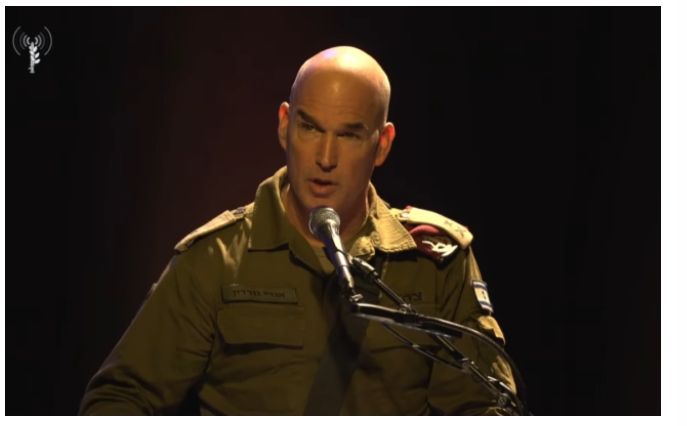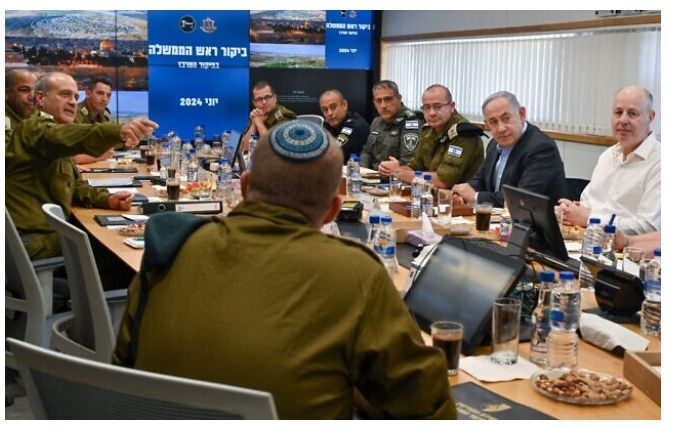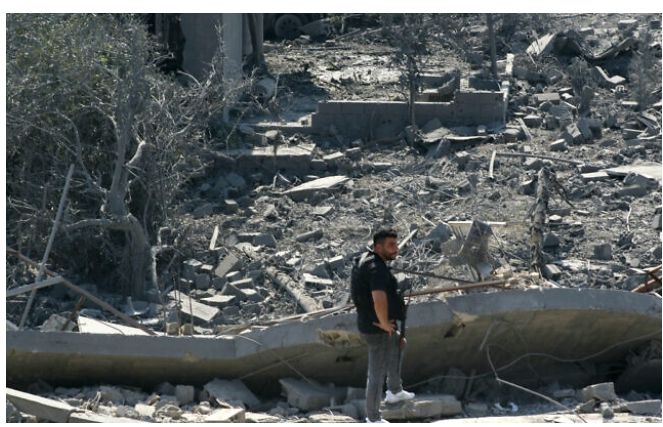A member of the Lebanese security forces inspects the damage around a building that was targeted by an Israeli airstrike in the southern Lebanese town of Wadi Jilo, east of Tyre, on June 6, 2024. (Mahmoud Al-Zayyat.)
Netanyahu notes heavy international pressure amid multi-front military campaign, as report details US warning that ground operation in Lebanon could draw Iran into war.
The Israeli military’s top general in northern Israel said Thursday the army was ready to expand its conflict with the Hezbollah terror group if need be in order to bring months of deadly cross-border hostilities to a close, a day after a reservist was killed and 10 others injured in an explosive drone attack on a northern town
Maj. Gen. Ori Gordin, head of the Israel Defense Forces’s Northern Command, spoke hours before the city of Kiryat Shmona was hit in an attack after drone warning sirens were heard in the area. It was not immediately clear what impacted the city, with police saying damage was caused to property, but there were no injuries.
The restive border region has been hounded by a stream of rocket, missile and drone strikes for the last eight months, leading to the displacements of tens of thousands of residents.
“Hezbollah has suffered severe blows. About 420 terrorists and senior operatives were eliminated,” Gordin said at a ceremony marking 18 years since the Second Lebanon War, the last major military engagement between Israel and Hezbollah.
Gordin said Hezbollah terror infrastructure built up over years had been destroyed in Israeli counterstrikes since the terror group began lobbing rockets and other projectiles at the north on October 8.
“We have been doing this for eight months, with the understanding that this time too, like 18 years ago, we have no choice but to continue fighting, together, until the mission is completed,” he said.
Gordin said the IDF had last week completed preparations for a campaign against Hezbollah, and that troops were training for the fight.
“We are prepared and ready, and when we will be ordered, the enemy will meet a strong and ready army,” he said.
The IDF earlier said it carried out a strike against two Hezbollah operatives, and the group announced that one member was killed. The army also announced strikes on other Hezbollah buildings.

Chief of the IDF Northern Command, Maj. Gen. Ori Gordin speaks at a ceremony marking 18 years since the Second Lebanon War, June 6, 2024. (Screenshot: Israel Defense Forces.)
On Tuesday, IDF Chief of Staff Herzi Halevi said Israel was nearing a decision on whether to expand the conflict to stanch Hezbollah’s daily attacks on the north, which have resulted in 10 civilian deaths on the Israeli side, as well as the deaths of 15 IDF soldiers and reservists.
The same day, Hezbollah deputy leader Sheikh Naim Qassem told broadcaster Al Jazeera that the group’s decision was not to widen the war but that it would fight one if it was imposed on it. Qassem said the Lebanon front would not quiet until the Gaza war stops.
Israel’s military and political leadership has come under increasing pressure to end the Hezbollah attacks and push the group away from the border, either via diplomatic arrangement or by launching an all-out war.
Tens of thousands of civilians from towns and villages near the border have been displaced by the attacks, which have also caused widespread property damage and earlier this week sparked large brushfires.
There are fears that left in place, Hezbollah could launch a surprise attack on the north like Hamas’s October 7 assault on southern Israel, which decimated whole communities and left some 1,200 dead and hundreds abducted into Gaza.
“The time has come to end the foot-dragging,” Culture and Sports Minister Miki Zohar said while touring the north Thursday. “Delaying a war against Hezbollah could bring about a greater disaster than that of October 7.”
In the border town of Metula, which was targeted by an anti-tank missile Thursday — which caused no damage but started a fire — local council head David Azoulai said the army should not wait for fighting in Gaza to end before launching an offensive against Hezbollah.
“If we don’t go into Lebanon, our future will be much worse,” he told Army Radio. “[Currently] we’re only responding to their fire and not going on the offensive.”
United States President Joe Biden’s administration has been cautioning Israel that should it go on the attack against Hezbollah, Iran may intervene, transforming a localized war into a much more complex one, Axios reported Thursday, citing American officials.
According to the report, Washington fears a ground invasion could spark an influx of Iran-backed fighters entering Lebanon from Syria to join the fight.
US State Department spokesperson Matthew Miller said Tuesday that Washington does “not support a full war with Hezbollah,” but Israel had the right to defend itself.
The US and France have been attempting to broker a diplomatic solution to end the fighting without the need for war, but progress has been halting.

Prime Minister Benjamin Netanyahu during a meeting at the IDF Central Command headquarters on June 6, 2024. (Kobi Gideon/GPO.)
Prime Minister Benjamin Netanyahu noted “difficult international pressures being exerted on us” as Israel wages a “tough war on multiple fronts,” in comments Thursday following a visit to IDF Central Command headquarters.
“I can guarantee one thing,” Netanyahu said in a video statement. “Things will not be as they were. We will change this reality.”
In a sign that hostilities could expand soon, the army announced Thursday it had delayed a planned move to reduce the size of local security teams in northern towns by several weeks, following a new assessment of the situation.
On Wednesday, a pair of explosive-laden drones slammed into the Druze-majority town of Hurfeish, located several kilometers from the Lebanon border, killing Staff Sgt. (res.) Refael Kauders, 39, who served as a Military Rabbinate coordinator. Warning sirens did not sound before the attack.
According to initial military assessments, the two drones impacted within a few minutes of each other, with the second seemingly targeting rescue crews who arrived to treat those wounded by the first. Hezbollah has employed such a tactic several times amid the war.
Hezbollah began carrying out near-daily attacks on Israeli communities and military posts on October 8, saying it was doing so to support Gaza as Israel launched an offensive to eliminate Hamas following the October 7 massacre.
The terror group in recent months has increasingly been using explosive-laden drones, alongside anti-tank guided missiles and barrages of rockets.
Following the attack, the military announced that it had carried out strikes against a series of Hezbollah targets in southern Lebanon throughout the day, including Hezbollah infrastructure in Naqoura and Matmoura, buildings used by the terror group in Ayta ash-Shab, and an observation post in Khiam.
On Thursday, it said it struck two Hezbollah operatives in a drone strike in Aitaroun, as well as several buildings used by the terror group in the town. Overnight, it struck a Hezbollah weapons depot in southern Lebanon’s Wadi Jilou, as well as two more sites belonging to the terror group near Aadchit and buildings and infrastructure used by Hezbollah in Beit Yahoun, Seddiqin and Odaisseh.
Hezbollah said member Hussein Al-Houran, from the town of Bint Jbeil, which is adjacent to Aitaroun, was killed amid fighting with Israel.
The Iran-backed organization has named 331 members who have been killed by Israel during the ongoing skirmishes, mostly in Lebanon but some also in Syria. In Lebanon, another 62 operatives from other terror groups, a Lebanese soldier, and dozens of civilians have been killed.

